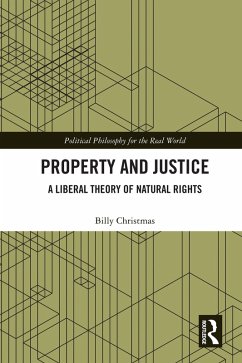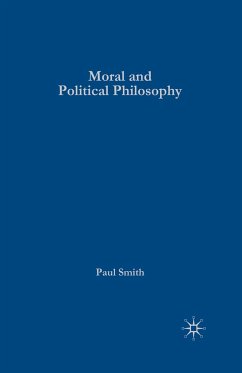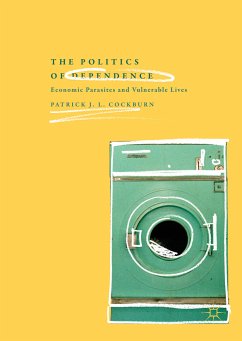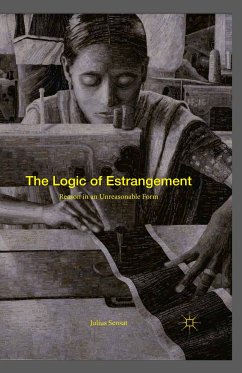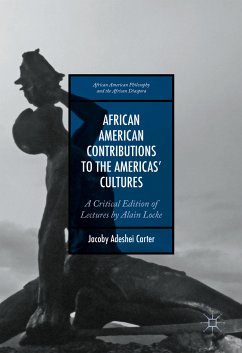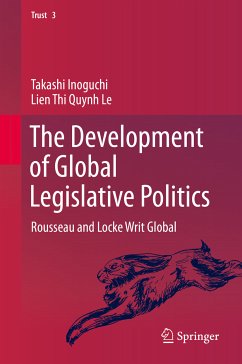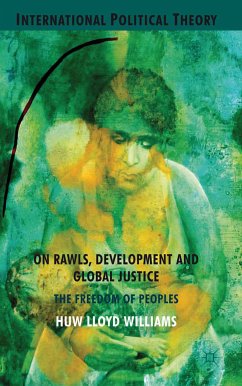
eBook, PDF
Intellectual Property and Theories of Justice (eBook, PDF)

PAYBACK Punkte
20 °P sammeln!






Fourteen philosophers, economists and legal scholars address the question 'Can intellectual property rights be fair?' What differentiates intellectual from real property? Should libertarians or Rawlsians defend IP rights? What's wrong with free-riding? How can incentives be taken into account by theories of justice?
Dieser Download kann aus rechtlichen Gründen nur mit Rechnungsadresse in A, B, BG, CY, CZ, D, DK, EW, E, FIN, F, GR, HR, H, IRL, I, LT, L, LR, M, NL, PL, P, R, S, SLO, SK ausgeliefert werden.
DANIEL ATTAS is Senior Lecturer in Philosophy and Director of the Integrative Program: Philosophy, Economics, Political Science, Hebrew University of Jerusalem, Israel PAUL BELLEFLAMME is Professor of Economics at Université catholique de Louvain, Belgium ALEXANDRA COUTO is at Oxford University, UK GEERT DEMUIJNCK is Professor of Ethics and Political Philosophy, Catholic University of Lille, France PETER DIETSCH is Assistant Professor, Philosophy Department, Université de Montréal, Canada SPERANTA DUMITRU is a Post-doc Research Fellow, CERSES (CNRS and Université Paris-Descartes, France GILLES FALQUET is Professor of Informatics, University of Geneva, Switzerland SHUBHA GHOSH is a Professor of Law, Southern Methodist University Dedman School of Law, USA FRANÇOIS GRIN is Professor of Economics, University of Geneva and a Visiting Professor, University of Lugano, Switzerland ANNABELLE LEVER is a Fellow, Philosophy Department, London School of Economics and Political Science, UK GIOVANNI BATTISTA RAMELLO is Associate Professor of Industrial Economics, Università del Piemonte Orientale, Italy SEANA VALENTINE SHIFFRIN is Professor of Law and Professor of Philosophy at the University of California, LA, USA JONATHAN TRERISE is a Lecturer, Florida International University, Miami, USA
Produktdetails
- Verlag: Palgrave Macmillan UK
- Seitenzahl: 277
- Erscheinungstermin: 27. Oktober 2008
- Englisch
- ISBN-13: 9780230582392
- Artikelnr.: 45965387
' a much needed intervention into current debates over intellectual property and social justice the essays here question and probe deeply the oversimplified justification of modern intellectual-property law sophisticated and compelling, teaching much about the ways in which philosophy can illuminate and enrich economic analysis of law.' Madhavi Sunder, Erasmus Journal for Philosophy and Economics
'This book of readings on intellectual property is unusual in three respects: the international cast of the contributors, the widening of the focus of analysis to include not only law and economics but also philosophy, and the decision to examine both theoretical questions and concrete practical questions. Most important is the high
'This book of readings on intellectual property is unusual in three respects: the international cast of the contributors, the widening of the focus of analysis to include not only law and economics but also philosophy, and the decision to examine both theoretical questions and concrete practical questions. Most important is the high
Mehr anzeigen
quality of the contributions. They not only are of high intellectual quality, but they are lucid and well written; and the introduction is a model of clarity.' - Richard A. Posner, US Court of Appeal, Seventh Circuit
'Dramatically strengthened and globalized, intellectual property rules are shaping the evolution of whole sectors of the world economy: technology, pharmaceuticals, agriculture, publishing, and entertainment. The world's most powerful corporations and governments are therefore fighting intensely over the design of these rules. The present collection highlights the main moral issues raised by intellectual property rights. It discusses these issues at the level of principle, and also in a series of focused moral analysesof the most pressing innovation-access dilemmas and of various reform ideas. An excellent introduction to a complex, shifting, and very important moral terrain.' - Thomas Pogge, Leitner Professor of Philosophy and International Affairs Yale University
'This collection of 12 essays provides a fascinating insight into the application of classical theories of justice to both fundamental issues in the field of intellectual property and contemporary, practical issues.' European Intellectual Property Review
'Dramatically strengthened and globalized, intellectual property rules are shaping the evolution of whole sectors of the world economy: technology, pharmaceuticals, agriculture, publishing, and entertainment. The world's most powerful corporations and governments are therefore fighting intensely over the design of these rules. The present collection highlights the main moral issues raised by intellectual property rights. It discusses these issues at the level of principle, and also in a series of focused moral analysesof the most pressing innovation-access dilemmas and of various reform ideas. An excellent introduction to a complex, shifting, and very important moral terrain.' - Thomas Pogge, Leitner Professor of Philosophy and International Affairs Yale University
'This collection of 12 essays provides a fascinating insight into the application of classical theories of justice to both fundamental issues in the field of intellectual property and contemporary, practical issues.' European Intellectual Property Review
Schließen
Für dieses Produkt wurde noch keine Bewertung abgegeben. Wir würden uns sehr freuen, wenn du die erste Bewertung schreibst!
Eine Bewertung schreiben
Eine Bewertung schreiben
Andere Kunden interessierten sich für


